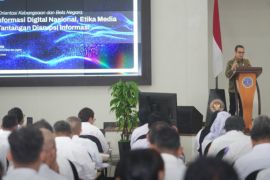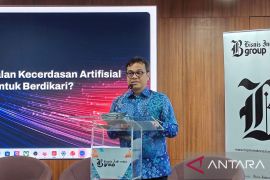Biodiversity is an important factor in research and innovation in biology, agriculture, and healthJakarta (ANTARA) - The National Research and Innovation Agency (BRIN) is developing artificial intelligence (AI) to collect Indonesia's biodiversity genomic data that will be beneficial for the development, including in the agriculture and health sectors.
"Biodiversity is an important factor in research and innovation in biology, agriculture, and health," Head of BRIN's Electronics and Informatics Research Organization, Budi Prawara, told ANTARA here on Thursday.
The problem of analyzing a large number of genomics data sets and uncovering hidden patterns can be handled by AI, which can expedite as well as make a more accurate and efficient pattern analysis from data to find functional new patterns, such as in precision medication.
Indonesia is categorized as a megadiversity country, accounting for two of the 35 biodiversity hotspots in the world, Prawara informed.
In addition to non-human biodiversity, biodiversity in the Indonesian population also poses challenges to and provides opportunities for the development of precision medication.
However, to this day, Indonesia's rich biodiversity, both human and non-human, has not been utilized much.
In fact, the size of genomic data collected from both humans and non-humans in Indonesia is still relatively small compared to developed countries or neighboring countries.
Handling the gap between the potential of biodiversity resources and their utilization necessitates research and innovation, and artificial intelligence is a research field that can advance genomic utilization.
To add data collection and genome processing, BRIN is currently managing equipment for genome sequencing.
The equipment comprises Illumina and Oxford Nanopores long-read technology based on Sanger and Next Generation Sequencing (short reads-based).
The sequencing types produce genomic data from human and non-human samples.
Operating them requires high-performance computer (HPC) systems for data acquisition, analysis during the sequencing, and further analysis of genomic data.
The HPC infrastructure at BRIN can also be accessed or utilized by non-BRIN researchers through BRIN's e-service.
Collaboration between BRIN's researchers and researchers from universities and related institutions, such as hospitals, is very important to increase genomic data collection.
To this end, Prawara said he expects the building of strong collaboration between researchers from various institutions to develop artificial intelligence for biodiversity.
Related news: BRIN developing AI-based platform for natural resource monitoring
Related news: BRIN seeks to advance biodiversity research using cryo-EM
Related news: Turn crisis into opportunity through research, innovation: BRIN
Translator: Martha H S, Fadhli Ruhman
Editor: Sri Haryati
Copyright © ANTARA 2022











